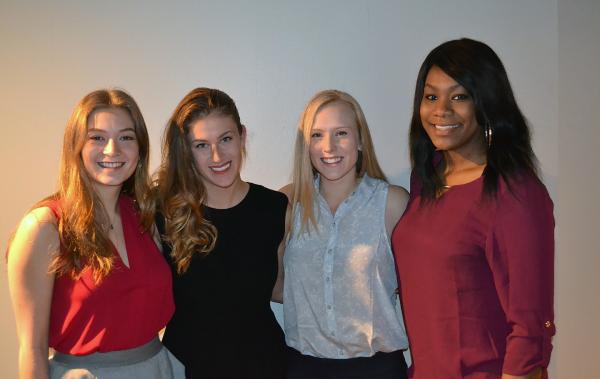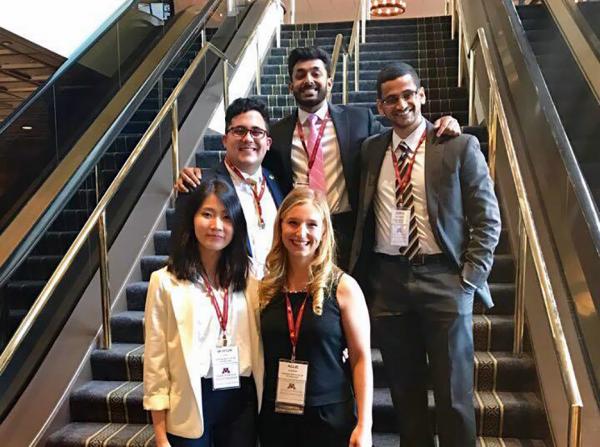Two teams of undergraduate students from the Wallace H. Coulter Department of Biomedical Engineering, presenting new devices to improve women’s health care options, reached the final phase of the Round One entrepreneurship competition at the Georgia Institute of Technology.
And the timing of Round One could hardly have been better, according to Sarah Bush and her TINA teammates, one of the BME teams (the other was Hera Health Solutions). TINA had just finished an impressive run in Georgia Tech’s InVenture Prize competition, reaching the semifinals with their device – an innovative tampon aid designed to ensure and improve independence and discretion for women with limited hand mobility.
They didn’t finish in the money but they did receive some hopeful advice from the impressed InVenture judges following the February semifinal round: get more experience presenting the product, and reapply next year.
“We were really hoping to make the finals and were looking for more opportunities,” explains Bush, whose teammates are Ali Kight, Elise Pippert, and Janay Harris. “Right after InVenture, on my way to class, I saw a poster for Round One. It’s just what we needed.”
TINA and Hera Health Solutions were among the 26 teams that applied to Round One, which was sponsored by Georgia Tech’s chapter of AKPsi, a coed professional business fraternity, and Startup Exchange (the largest student entrepreneurial community at Georgia Tech).
“It was a Shark Tank style event,” explains Idicula Mathew of Hera Health, whose teammates are Garret Whitfield, Allie Johnson, Aditya Muralidhar, and Mi Hyun Choi, a fifth-year student who also is a 2017 Petit Undergraduate Scholar.
The team developed a product called Eucontra (which began as a senior Capstone project), a resorbable contraceptive implant designed to eliminate painful and costly removal surgery for women worldwide.
All of the teams submitted an application and a video presentation. From there, eight were selected for a first phase of competition – the mentorship phase, during which the student teams worked with local start-ups on their pitch. Ultimately, four teams were selected to pitch their ideas in front of the pros during the final investor phase.
Basically, if you reached this round, you were a winner in the competition.
“Round One served as a great platform where we could present Eucontra to potential investors and mentors within the startup community in and around Atlanta,” says Mathew. “We received positive feedback and advice regarding market analysis, FDA approval tracks, exit strategies, and market entry points for international markets.”
In TINA’s case, the team didn’t realize it made the mentorship phase until the day before. Initially, says Bush, “we were put on the waiting list.”
TINA made the most of the advice it had received during the InVenture experience, and that Saturday (March 11) from its mentors – they did well enough to impress the judges and advance to the final investor phase.
“The point in the final phase was to establish connections with panelists, and we did that,” says Bush.
TINA made at least a half dozen contacts with potential investors, and will move forward with the clarity of conviction.
“We’re BME students, not business people, so we have to dig in on the business side,” says Bush, whose team was also planning to participate in the Inventions to Serve competition (held through the Scheller College of Business at Georgia Tech). “But we’ve been in contact with so many women who desperately need this device. The need is obvious. We have to do this now.”
Hera Health wasted little time following Round One, competing in the Emerging Medical Innovation Valuation competition in the Design of Medical Devices Conference at the University of Minnesota. Eucontra took third place, and will be awarded a full valuation, including a presentation and report from the University of Minnesota’s Medical Industry Valuation Laboratory (a service that usually comes with a $15,000 fee).
Mathew says that Eucontra is the first-ever resorbable contraceptive, a long-term, subdermal arm implant designed to help improve the lives of millions of women across the planet.
So, the Hera Health team is going ahead with its intention to enter the market as soon as possible (after finishing proof of concept and further testing and trials), with a device that Mathew believes, “will help revolutionize the field of female contraception worldwide.”
LINKS:
Media Contact
Keywords
Latest BME News
Jo honored for his impact on science and mentorship
The department rises to the top in biomedical engineering programs for undergraduate education.
Commercialization program in Coulter BME announces project teams who will receive support to get their research to market.
Courses in the Wallace H. Coulter Department of Biomedical Engineering are being reformatted to incorporate AI and machine learning so students are prepared for a data-driven biotech sector.
Influenced by her mother's journey in engineering, Sriya Surapaneni hopes to inspire other young women in the field.
Coulter BME Professor Earns Tenure, Eyes Future of Innovation in Health and Medicine
The grant will fund the development of cutting-edge technology that could detect colorectal cancer through a simple breath test
The surgical support device landed Coulter BME its 4th consecutive win for the College of Engineering competition.









